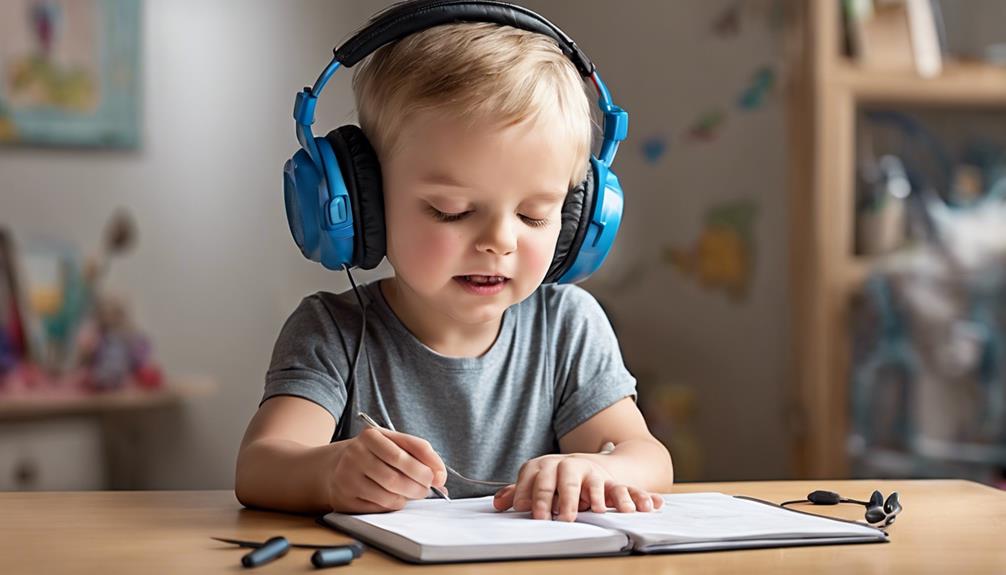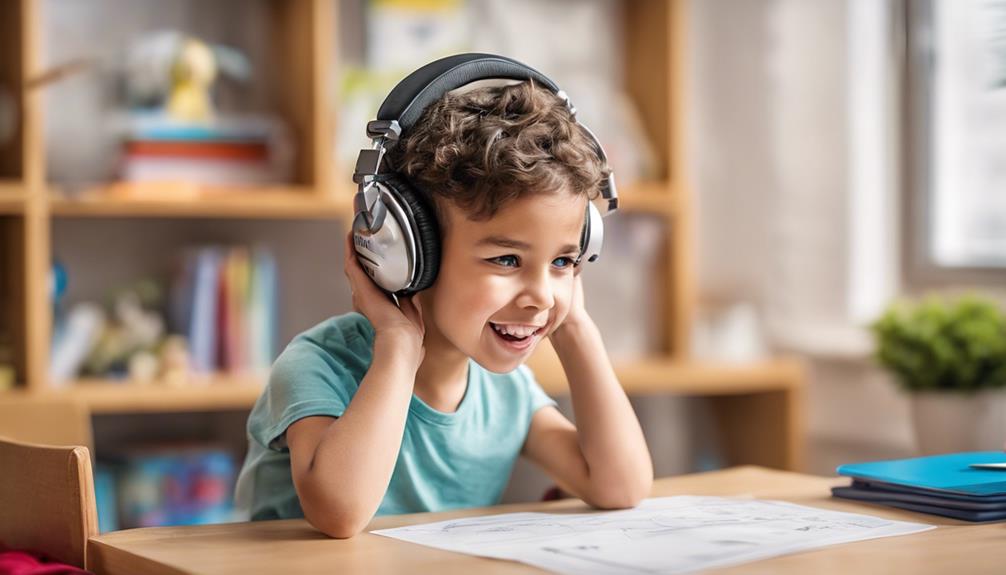As speech therapists, we often liken auditory memory to a mental filing cabinet, where each word or instruction is stored for later retrieval. Imagine trying to find an important document in a messy cabinet – it can be frustrating, right?
Well, in speech therapy, we aim to help individuals organize and access their auditory memories effectively. So, how can we achieve this? By setting specific auditory memory goals that target different aspects of memory recall, we can guide individuals towards improved communication and comprehension skills.
Key Takeaways
- Strengthen auditory memory through repetition, visualization, and memory games.
- Enhance memory retention with active engagement, recall, and following directions.
- Improve language processing with chunking, paraphrasing, and structured strategies.
- Utilize technology, like apps and simulations, for auditory memory enhancement.
Enhancing Auditory Attention Span
Enhancing auditory attention span in speech therapy is essential for improving individuals' ability to focus on and retain spoken information effectively. Auditory working memory, which involves the ability to temporarily store and manipulate auditory information, plays a vital role in various aspects of daily life such as following conversations, understanding instructions, and participating in educational settings.
By targeting auditory attention span in therapy sessions, individuals can enhance their auditory working memory capacity, leading to improved communication skills and academic performance. Strategies like repetition, visualization, and self-rehearsal techniques are commonly used to strengthen auditory attention span.
Building this skill not only supports cognitive development but also enables individuals to engage more fully in social interactions by better processing and responding to verbal cues. Overall, focusing on enhancing auditory attention span in speech therapy can have a profound impact on individuals' ability to navigate and succeed in various communication contexts.
Improving Auditory Discrimination Skills

Developing auditory discrimination skills is crucial in speech therapy to enhance individuals' ability to distinguish between similar sounds or words, improving overall comprehension and communication. Auditory memory plays a significant role in this process, as it involves remembering auditory information, such as specific sounds or words, to accurately interpret and respond to spoken language. By honing auditory discrimination skills, individuals can better recognize subtle differences in speech sounds, leading to improved listening abilities and the capacity to follow directions accurately.
Speech therapy targets auditory discrimination to help individuals sharpen their auditory processing abilities, which are essential for effective communication. Through targeted exercises and practice, individuals can strengthen their auditory discrimination skills, supporting better speech production and overall language development. By engaging in activities that challenge auditory discrimination, such as identifying differences in similar words or sounds, individuals can enhance their ability to perceive and interpret auditory information, ultimately facilitating clearer communication and comprehension.
Strengthening Auditory Sequencing Abilities
When working on strengthening auditory sequencing abilities, we focus on improving the child's capacity to remember and repeat sequences of sounds accurately.
By targeting auditory sequencing, we help enhance the child's ability to follow multi-step directions and recall information presented in a specific order.
Developing these skills can support the child in academic tasks such as spelling, reading comprehension, and math problem-solving.
Order of Sounds
Improving our ability to recall and reproduce the correct order of sounds heard is essential for strengthening auditory sequencing abilities. This skill plays a vital role in following directions, understanding stories, and processing language effectively.
In speech therapy, focusing on auditory sequencing can significantly enhance communication skills, listening comprehension, and overall language development. Engaging in activities like sequencing stories, repeating sequences of sounds, and playing memory games can effectively boost auditory memory for sound order.
As individuals make progress in auditory sequencing, they often experience increased confidence in communication and improved academic performance. By honing the order of sounds, individuals can pave the way for clearer communication and better engagement in various aspects of life.
Listening Skills Practice
Strengthening auditory sequencing abilities through listening skills practice is vital for enhancing auditory memory goals in speech therapy. By engaging in activities that require following and sequencing stories or instructions, individuals can improve their auditory memory skills. Practicing these skills not only helps in recalling and ordering auditory information but also supports language development by enhancing auditory processing and recall.
Targeting auditory memory goals can result in better comprehension and communication abilities during therapy sessions. Through consistent listening skills practice, individuals can sharpen their auditory memory skills, leading to more effective communication and overall progress in speech therapy. It's essential to incorporate these practices into therapy sessions to support individuals in achieving their auditory memory goals.
Sequencing Tasks Benefits
To build upon the foundation of listening skills practice, we now focus on the benefits of sequencing tasks in strengthening auditory sequencing abilities for improved auditory memory goals in speech therapy. Sequencing tasks play a crucial role in enhancing auditory memory by aiding individuals in organizing and recalling information in a specific order. By improving auditory sequencing abilities, one can effectively follow multi-step directions and process information presented in a logical sequence. This practice not only boosts memory retention but also aids in better retrieval of auditory information. Setting auditory sequencing goals within speech therapy sessions can lead to significant improvements in communication skills and overall cognitive function.
| Benefits of Sequencing Tasks | Strengthen Auditory Sequencing Abilities | Enhance Memory Retention |
|---|---|---|
| Aid in Organizing Information | Improve Following Multi-Step Directions | Boost Retrieval of Information |
| Facilitate Recalling in Order | Enhance Understanding of Logical Sequences | Improve Communication Skills |
Enhancing Auditory Recall Capacity

Enhancing auditory recall capacity plays a crucial role in boosting a child's ability to retain and recall spoken information during speech therapy sessions. By developing specific auditory memory goals tailored to the child's needs, therapists can enhance communication skills and overall language development. These goals, when measurable, allow for tracking progress and adjusting therapy techniques effectively.
Strategies such as repetition, visualization, and chunking can be implemented to strengthen auditory memory skills. Working on auditory memory goals not only improves comprehension but also aids in following directions and enhances overall communication abilities in children undergoing speech therapy.
Through focused efforts on enhancing auditory recall capacity, therapists can create a solid foundation for improved speech and language skills, enabling children to communicate more effectively and participate more fully in various aspects of their lives.
Developing Auditory Processing Speed

Improving auditory processing speed is crucial for enhancing communication skills, comprehension abilities, and overall learning efficiency, particularly within the realm of speech therapy interventions. Increasing how quickly one can recognize and interpret auditory information can significantly impact various aspects of daily life.
Here are some practical ways to develop auditory processing speed:
- Engage in Auditory Discrimination Tasks: These activities challenge the brain to differentiate between similar sounds, improving the ability to process auditory information rapidly.
- Practice Auditory Sequencing Exercises: By arranging auditory stimuli in a specific order, individuals can enhance their sequencing abilities and processing speed.
- Participate in Timed Listening Activities: Setting time limits for listening tasks can train the brain to process information swiftly and accurately.
- Utilize Speech Therapy Techniques: Speech therapists can incorporate specialized techniques and exercises to specifically target and improve auditory processing speed.
Improving Auditory Working Memory

Our focus lies in refining auditory working memory skills to strengthen the capacity to recall and process auditory information effectively. Improving auditory working memory is crucial for better communication and language processing. Strategies such as repetition, visualization, chunking, and paraphrasing can enhance auditory memory skills. These techniques aid in following spoken instructions accurately, retaining and repeating spoken information, and recalling unrelated syllables. By developing auditory working memory skills, individuals can improve their ability to comprehend and engage in daily interactions more effectively.
| Strategies | Description | Benefits |
|---|---|---|
| Repetition | Repeating information to enhance retention | Improved recall |
| Visualization | Creating mental images to aid memory | Enhanced processing |
| Chunking | Breaking information into smaller chunks | Easier retention |
Enhancing Auditory Memory for Details

When aiming to enhance auditory memory for details, we focus on memory retention strategies that improve listening skills. Techniques such as repetition, visualization, and chunking aid in remembering intricate information.
Paraphrasing key details heard is also crucial for strengthening auditory memory and facilitating better comprehension.
Memory Retention Strategies
To enhance auditory memory for details, incorporating visualization strategies to create mental images of information heard can significantly aid in memory recall. When dealing with auditory information, our team recommends the following memory retention strategies:
- Engage actively by focusing on the speaker and visualizing the details being shared.
- Summarize key points in your own words to reinforce understanding.
- Break down complex auditory information into smaller, manageable chunks for better retention.
- Utilize repetition and rehearsal techniques to strengthen memory recall of specific details.
Improving Listening Skills
Enhancing auditory memory for details involves implementing effective strategies to improve listening skills, focusing on recalling specific information accurately. Working memory skills are crucial in speech therapy sessions to enhance the ability to remember specific details.
Techniques such as repetition, self-rehearsal, visualization, chunking, and paraphrasing can be instrumental in improving auditory memory for details. By engaging in activities that require picturing and recalling auditory information, individuals can strengthen their auditory memory.
Breaking down auditory information into smaller, more manageable chunks through methods like chunking can aid in better retention and recall of details. Encouraging active listening and participation in tasks that involve recalling specific details can significantly boost auditory memory skills during speech therapy sessions.
Strengthening Auditory Memory for Instructions

One effective strategy to strengthen auditory memory for instructions is through practicing active listening skills and utilizing techniques such as repeating instructions back to enhance retention.
To further enhance auditory memory, breaking down complex instructions into smaller steps can aid in comprehension and retention.
Additionally, using visual aids alongside verbal instructions can reinforce memory retention by providing multiple sensory inputs.
Engaging in activities that require following multi-step directions not only provides practical application but also helps in boosting auditory memory skills through repeated practice.
Improving Auditory Memory for Conversations

Improving auditory memory for conversations involves developing effective memory strategies to recall details and enhance listening skills in social interactions. To achieve this, implementing exercises that focus on active listening techniques is crucial. Practicing attentive listening not only ensures better understanding but also aids in boosting auditory memory during conversations. Setting specific goals to remember key points and responses in dialogues can provide a structured approach to improving memory retention in social settings.
Additionally, utilizing visual cues or note-taking can be beneficial in supporting auditory memory during discussions. These tools can serve as prompts to help remember important information shared during conversations. By incorporating these memory strategies into daily interactions, individuals can gradually enhance their ability to retain and recall details from conversations, ultimately leading to more meaningful and engaging communication experiences.
Enhancing Auditory Memory for Storytelling

When enhancing auditory memory for storytelling, we focus on story recall techniques and memory-building activities.
Engaging in role-playing scenarios and using visual aids can help children remember and recall details from stories.
Encouraging children to retell stories in their own words and implementing sequential memory tasks are effective strategies for strengthening auditory memory skills.
Story Recall Techniques
Enhancing auditory memory for storytelling involves implementing effective story recall techniques that focus on memory retention through visualization, active listening, repetition of key elements, and engaging in retelling activities.
Four key techniques to enhance story recall for better auditory memory:
- Visualization Strategies: Creating mental images of the story can aid in remembering details effectively.
- Active Listening: Encouraging attentive listening during story narration can enhance auditory memory retention.
- Repetition of Key Elements: Repeating important story elements reinforces memory recall.
- Engaging in Retelling Activities: Actively participating in retelling the story can strengthen auditory memory skills for improved storytelling abilities.
Memory Building Activities
Engage children in interactive storytelling sessions to strengthen their auditory memory skills for better retention and recall. Memory building activities play a crucial role in enhancing children's ability to remember and retell stories. Here is a table summarizing effective memory building activities for storytelling:
| Activity | Description | Benefits |
|---|---|---|
| Role-playing | Encouraging children to act out stories they've heard helps reinforce auditory memory skills. | Enhances recall and understanding of story content. |
| Visual aids and props | Using visuals during storytelling provides additional context, aiding in memory retention. | Supports memory recall by offering cues and prompts. |
| Group storytelling sessions | Participating in group storytelling promotes active listening and interaction. | Improves auditory memory through engagement and collaborative learning. |
These activities create engaging opportunities for children to develop their auditory memory skills in a fun and interactive way.
Frequently Asked Questions
What Are the IEP Goals for Auditory Memory?
We aim to improve auditory memory by enhancing the ability to recall spoken words accurately. Goals may include following instructions, retaining numbers, and recalling syllables.
Our objectives focus on reproducing spoken sentences with precision to enhance communication skills. By tailoring goals to address specific deficits, we help children retain and recall auditory information effectively.
These efforts ultimately support better communication outcomes in speech therapy sessions.
What Are the Memory Strategies Goal for Speech Therapy?
We incorporate various memory strategies in speech therapy. These include:
- Repetition techniques for enhancing word recall
- Self-rehearsal methods for remembering lists and directions
- Visualization exercises to aid in comprehension
- Chunking strategies to break down information
- Paraphrasing for better listening skills
These strategies are tailored to improve memory retention and overall communication skills during therapy sessions.
What Is a Smart Goal for Auditory Comprehension?
We believe a SMART goal for auditory comprehension should be specific, measurable, achievable, relevant, and time-bound.
For instance, by the end of the school year, students could accurately recall and repeat spoken instructions with at least 90% accuracy. This goal ensures clear targets for improving auditory memory and helps track progress in speech therapy.
SMART goals in this area are crucial for enhancing listening and recall abilities, supporting academic and social success.
What Are the Goals of Auditory Discrimination Speech Therapy?
Sure thing!
In auditory discrimination speech therapy, our goals revolve around honing the ability to distinguish between similar sounds or words. By strengthening auditory processing and discrimination, we enhance listening skills and comprehension. These objectives help individuals recognize differences in pitch, tone, or phonemes, ultimately improving communication.
Achieving success in this therapy can lead to clearer speech, better language understanding, and enhanced overall communication skills.
Conclusion
In conclusion, focusing on these 10 auditory memory goals in speech therapy is like building a strong foundation for a house – essential for effective communication and comprehension skills.
By targeting areas such as attention span, sequencing, recall, and processing speed, individuals can improve their auditory memory abilities and ultimately enhance their overall communication skills.
With dedication and practice, like tending to a garden, progress can be made in strengthening auditory memory for a brighter future.










